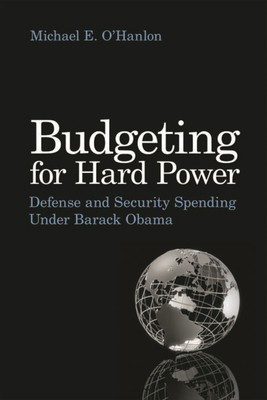
- We will send in 10–14 business days.
- Author: Michael E O'Hanlon
- Publisher: Brookings Institution Press
- ISBN-10: 0815702949
- ISBN-13: 9780815702948
- Format: 15 x 22.4 x 1.8 cm, minkšti viršeliai
- Language: English
- SAVE -10% with code: EXTRA
Reviews
Description
"
These are extraordinary times in U.S. national security policy. America remains engaged in both Iraq and Afghanistan while facing a global economic downturn. Homeland security concerns still abound in the wake of the September 11 attacks. Even as the financial crisis places considerable pressure on the U.S. budget, President Obama will have to spend a great deal of time and money on national security, hard power, and war. How should these competing demands be prioritized? How much money will be needed? How much will be available, and how should it be spent?
Budgeting for Hard Power continues the long and proud tradition of Brookings analysis on defense spending. As with previous volumes, this book examines the budgets of the Pentagon and the Department of Energy's nuclear weapons programs. But Michael O'Hanlon takes his analysis further, addressing the wide range of activities crucial for American security as a result of 9/11 and the ongoing wars. He considers homeland security resources and selected parts of the State Department and foreign operations budgets--offering a more complete overall look at the elements that make up America's ""hard power"" budget, a concept that he and Kurt Campbell wrote about in Hard Power: The New Politics of National Security (2006).
With future federal deficits projected to top $1 trillion, O'Hanlon calls for Defense, State, and Homeland Security budgets to be as frugal as possible. At the same time, he recognizes that resources should be selectively increased in certain areas to compensate for years of systematic underfunding, especially in certain areas of homeland security, diplomacy, and foreign assistance. In his typically clear and concise manner, O'Hanlon shows policymakers how to wrestle with the resource allocation decisions affecting the national security of the United States.
"EXTRA 10 % discount with code: EXTRA
The promotion ends in 21d.08:03:45
The discount code is valid when purchasing from 10 €. Discounts do not stack.
- Author: Michael E O'Hanlon
- Publisher: Brookings Institution Press
- ISBN-10: 0815702949
- ISBN-13: 9780815702948
- Format: 15 x 22.4 x 1.8 cm, minkšti viršeliai
- Language: English English
"
These are extraordinary times in U.S. national security policy. America remains engaged in both Iraq and Afghanistan while facing a global economic downturn. Homeland security concerns still abound in the wake of the September 11 attacks. Even as the financial crisis places considerable pressure on the U.S. budget, President Obama will have to spend a great deal of time and money on national security, hard power, and war. How should these competing demands be prioritized? How much money will be needed? How much will be available, and how should it be spent?
Budgeting for Hard Power continues the long and proud tradition of Brookings analysis on defense spending. As with previous volumes, this book examines the budgets of the Pentagon and the Department of Energy's nuclear weapons programs. But Michael O'Hanlon takes his analysis further, addressing the wide range of activities crucial for American security as a result of 9/11 and the ongoing wars. He considers homeland security resources and selected parts of the State Department and foreign operations budgets--offering a more complete overall look at the elements that make up America's ""hard power"" budget, a concept that he and Kurt Campbell wrote about in Hard Power: The New Politics of National Security (2006).
With future federal deficits projected to top $1 trillion, O'Hanlon calls for Defense, State, and Homeland Security budgets to be as frugal as possible. At the same time, he recognizes that resources should be selectively increased in certain areas to compensate for years of systematic underfunding, especially in certain areas of homeland security, diplomacy, and foreign assistance. In his typically clear and concise manner, O'Hanlon shows policymakers how to wrestle with the resource allocation decisions affecting the national security of the United States.
"

Reviews